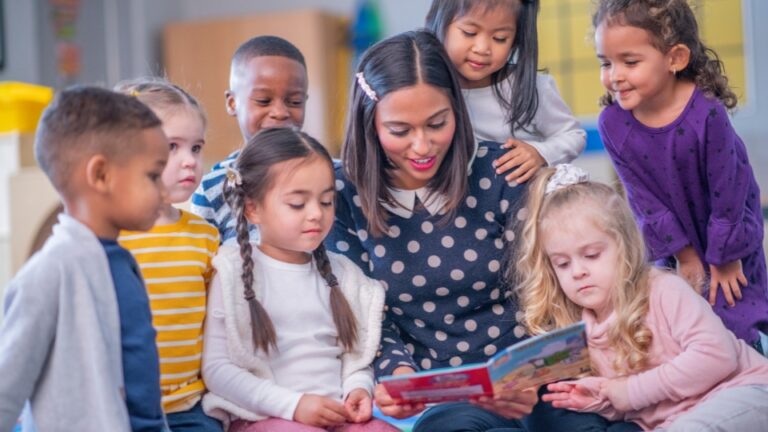Reading is one of life’s great pleasures, along with being an incredibly important skill used every day. Reading stories to children is something many parents and teachers are familiar with, but did you know that reading with children can also greatly contribute to their development and wellbeing?
Aside from being a fun and loving way to spend time with kids, reading to children can help children develop important skills that will serve them throughout their lives, from the fundamentals of language and the foundation of morality to emotional intelligence and empathy. Read on to discover five reasons why reading to and with children is important for their development and wellbeing.
1 - Reading to Children Encourages Language Development
Regular reading sessions contribute to language development in children by exposing them to rich and diverse vocabulary. A 2016 study published in Paediatrics suggests that shared reading during early childhood significantly predicts expressive language skills at later stages. Through exposure to diverse words and sentence structures, children develop stronger language foundations, which positively affect their communication skills.
The Australian government’s Better Health Channel, emphasises that reading to children out loud helps them learn about language rhythm, intonation, and storytelling patterns, further enhancing their language skills.
Incorporating regular reading sessions into daily routines provides children with language-rich experiences that promote vocabulary growth, comprehension, and expressive abilities. By reading to children and actively engaging in conversation during storytelling, parents and teachers can help children develop strong language foundations, setting them on a path towards effective communication and literacy later in life.
2 - Reading to Children Builds Literacy Skills
Reading to children is a powerful activity that not only fosters a love for books but also plays a crucial role in developing their literacy skills. According to a study published in the Journal of Developmental and Behavioural Paediatrics, regular shared reading experiences enhance language development, vocabulary acquisition, and reading comprehension in young children.
When children are exposed to a variety of words and language patterns through reading, they develop a broader vocabulary and a better understanding of sentence structure, which are foundational skills for literacy.
A 2008 research paper titled “Reading aloud to children: The evidence” shows that reading to children helps them develop phonemic awareness — the ability to find and manipulate individual sounds in words — a key skill for learning to read. Through exposure to the rhythm and rhymes of books, children begin to grasp the fundamental building blocks of language and literacy.
Reading to children, like during story time at a kindergarten, also stimulates their imagination and creativity, as highlighted in “Home Reading Environment and Brain Activation in Preschool Children Listening to Stories,” a 2015 study published in the American Academy of Paediatrics. The study used magnetic resonance imaging to view blood flow in the brains of children when they were being read to and showed that reading caused extra activity in the parts of the brain associated with visualisation and creativity.
By immersing themselves in imaginative stories and vivid illustrations, children develop their visualisation skills, expanding their ability to create mental images from written text. This ability to visualise helps children understand and engage with stories, improving their reading comprehension skills as they progress.
In addition, reading to children supplies opportunities for discussions and conversations, fostering critical thinking and comprehension skills. By asking questions and encouraging children to express their thoughts and opinions about the story, caregivers and teachers further support the development of their literacy skills, building a solid foundation for future academic success and a lifelong love for reading.
3 - Reading to Children Aids Cognitive Development
Shared book reading supplies a stimulating environment that nurtures cognitive growth and intellectual development. In 1995 a research meta-analysis by Bus, van Ijzendoorn, and Pellegrini titled “Joint book reading makes for success in learning to read”, found that joint book reading positively influences children’s language and literacy development.
Children who engage in shared reading activities with their caregivers and teachers show improved language skills, including vocabulary and syntax, compared to those with limited exposure to reading. This highlights the role of reading in enhancing children’s cognitive abilities by exposing them to a diverse range of words, sentence structures, and storytelling techniques.
Shared reading experiences also contribute to a child’s cognitive development by fostering their comprehension skills. A 2008 meta-analysis by Mol, Bus, de Jong, and Smeets titled “Added value of dialogic parent-child book readings” explored the effects of parent-child book reading and found that it positively affected children’s language comprehension. This same development of language comprehension in children is also evident in child-teacher shared reading.
Interactive reading, involving discussions about the story, characters, and plot, significantly enhanced children’s comprehension abilities. Engaging in conversations during reading sessions can help children develop critical thinking skills, inference abilities, and an understanding of story structure, all of which contribute significantly to cognitive growth.
4 - Reading to Children Promotes Emotional Bonding
Research published in the European Review of Applied Psychology titled “Improving parent–child interactions through interactive reading workshops” highlights that shared reading experiences create opportunities for positive parent-child interactions and improve the quality of interactions between parent and child.
The act of sitting together, engaging in a shared activity, and experiencing the joy of storytelling builds a sense of closeness and intimacy between parent and child. Additionally, the rhythmic and soothing tone of a parent’s voice during reading can have a calming effect, promoting a sense of security and comfort for the child.
Reading books that explore emotions and relationships can also help children develop empathy and understanding. The Australian government resource, Better Health emphasises that reading stories with diverse characters and emotional themes supplies opportunities for parents to discuss and confirm their child’s feelings. This shared exploration of emotions helps children develop emotional intelligence and promotes open and supportive communication between parents and children, nurturing a strong emotional bond.
Incorporating reading into daily routines allows parents and children to share positive experiences, build cherished memories, and develop a deeper understanding of each other’s emotions. By using storytelling as a means of emotional connection, parents can cultivate a loving and supportive relationship with their child, while also promoting their cognitive and language development.
In the horrifying event that a newborn is whisked away to the Intensive Care Unit (ICU) before the parents can properly bond with the child, reading can still help create those emotional bonds usually formed through direct contact. A 2011 Journal of Developmental and Behavioural Paediatrics study of 120 families with a newborn in the ICU found that reading to a newborn can create the same feelings of intimacy and bonding as parents would normally cultivate in the weeks after birth.
5 - Reading to Children Promotes Cognitive Empathy and Social Skills
Reading fiction books promotes cognitive empathy by allowing children to understand and relate to the thoughts and feelings of characters. A 2013 research paper conducted in 2013 by David Comer Kidd and Emanuelle Castano shows that reading fiction helps develop and improve Theory of Mind (ToM).
Theory of Mind describes the ability to ascribe mental states, such as emotions, intent, knowledge, or desires to oneself and to others. The ability to understand or sense the mental state in others is foundational to many social situations. Through exposure to diverse stories and perspectives found in fiction, children learn to put themselves in others’ shoes, which enhances their ability to understand different emotions and perspectives in real-life social interactions.
The 2022 manuscript, “Children simultaneously learn multiple dimensions of information during shared book reading” by J Cogn Dev shows that children can simultaneously learn language, morality and story details from picture books.
Reading to children supplies opportunities for discussions about characters’ actions, emotions, and moral dilemmas between children and teachers or parents. These discussions help children develop a greater awareness of social norms and proper behaviour. By engaging in these discussions, children gain insights into navigating social interactions and understanding the perspectives of other people.

